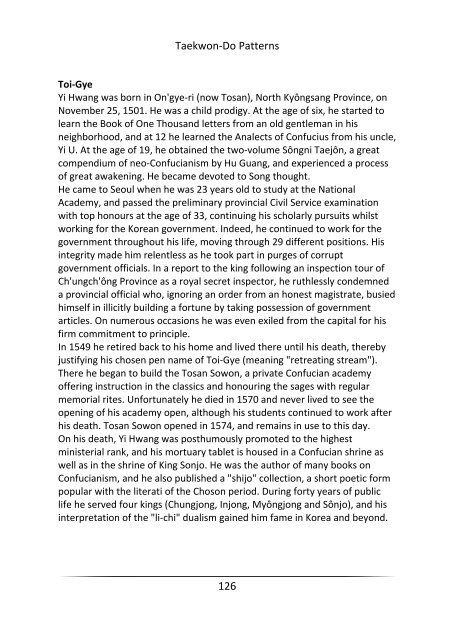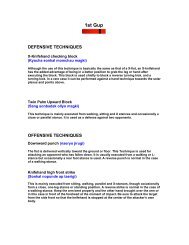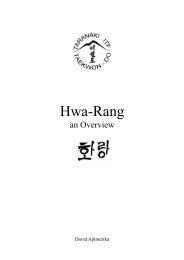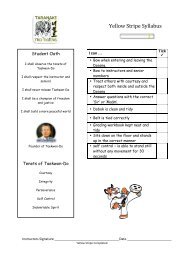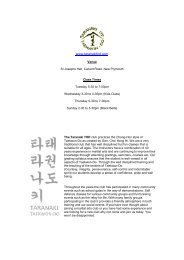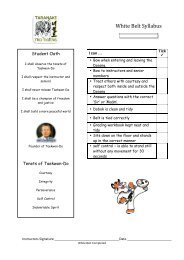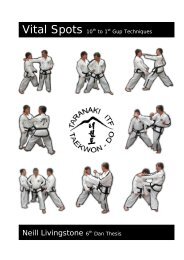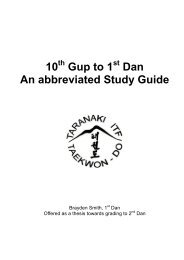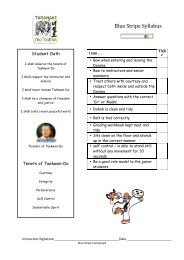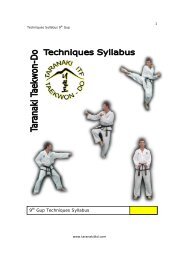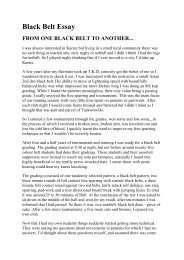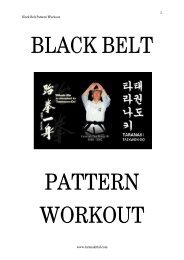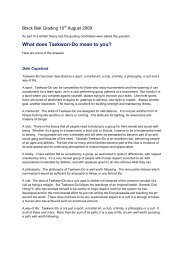Taekwon-Do Patterns (Tul) - Taranaki ITF Taekwondo
Taekwon-Do Patterns (Tul) - Taranaki ITF Taekwondo
Taekwon-Do Patterns (Tul) - Taranaki ITF Taekwondo
You also want an ePaper? Increase the reach of your titles
YUMPU automatically turns print PDFs into web optimized ePapers that Google loves.
<strong>Taekwon</strong>‐<strong>Do</strong> <strong>Patterns</strong><br />
Toi‐Gye<br />
Yi Hwang was born in On'gye‐ri (now Tosan), North Kyôngsang Province, on<br />
November 25, 1501. He was a child prodigy. At the age of six, he started to<br />
learn the Book of One Thousand letters from an old gentleman in his<br />
neighborhood, and at 12 he learned the Analects of Confucius from his uncle,<br />
Yi U. At the age of 19, he obtained the two‐volume Sôngni Taejôn, a great<br />
compendium of neo‐Confucianism by Hu Guang, and experienced a process<br />
of great awakening. He became devoted to Song thought.<br />
He came to Seoul when he was 23 years old to study at the National<br />
Academy, and passed the preliminary provincial Civil Service examination<br />
with top honours at the age of 33, continuing his scholarly pursuits whilst<br />
working for the Korean government. Indeed, he continued to work for the<br />
government throughout his life, moving through 29 different positions. His<br />
integrity made him relentless as he took part in purges of corrupt<br />
government officials. In a report to the king following an inspection tour of<br />
Ch'ungch'ông Province as a royal secret inspector, he ruthlessly condemned<br />
a provincial official who, ignoring an order from an honest magistrate, busied<br />
himself in illicitly building a fortune by taking possession of government<br />
articles. On numerous occasions he was even exiled from the capital for his<br />
firm commitment to principle.<br />
In 1549 he retired back to his home and lived there until his death, thereby<br />
justifying his chosen pen name of Toi‐Gye (meaning "retreating stream").<br />
There he began to build the Tosan Sowon, a private Confucian academy<br />
offering instruction in the classics and honouring the sages with regular<br />
memorial rites. Unfortunately he died in 1570 and never lived to see the<br />
opening of his academy open, although his students continued to work after<br />
his death. Tosan Sowon opened in 1574, and remains in use to this day.<br />
On his death, Yi Hwang was posthumously promoted to the highest<br />
ministerial rank, and his mortuary tablet is housed in a Confucian shrine as<br />
well as in the shrine of King Sonjo. He was the author of many books on<br />
Confucianism, and he also published a "shijo" collection, a short poetic form<br />
popular with the literati of the Choson period. During forty years of public<br />
life he served four kings (Chungjong, Injong, Myôngjong and Sônjo), and his<br />
interpretation of the "li‐chi" dualism gained him fame in Korea and beyond.<br />
126


